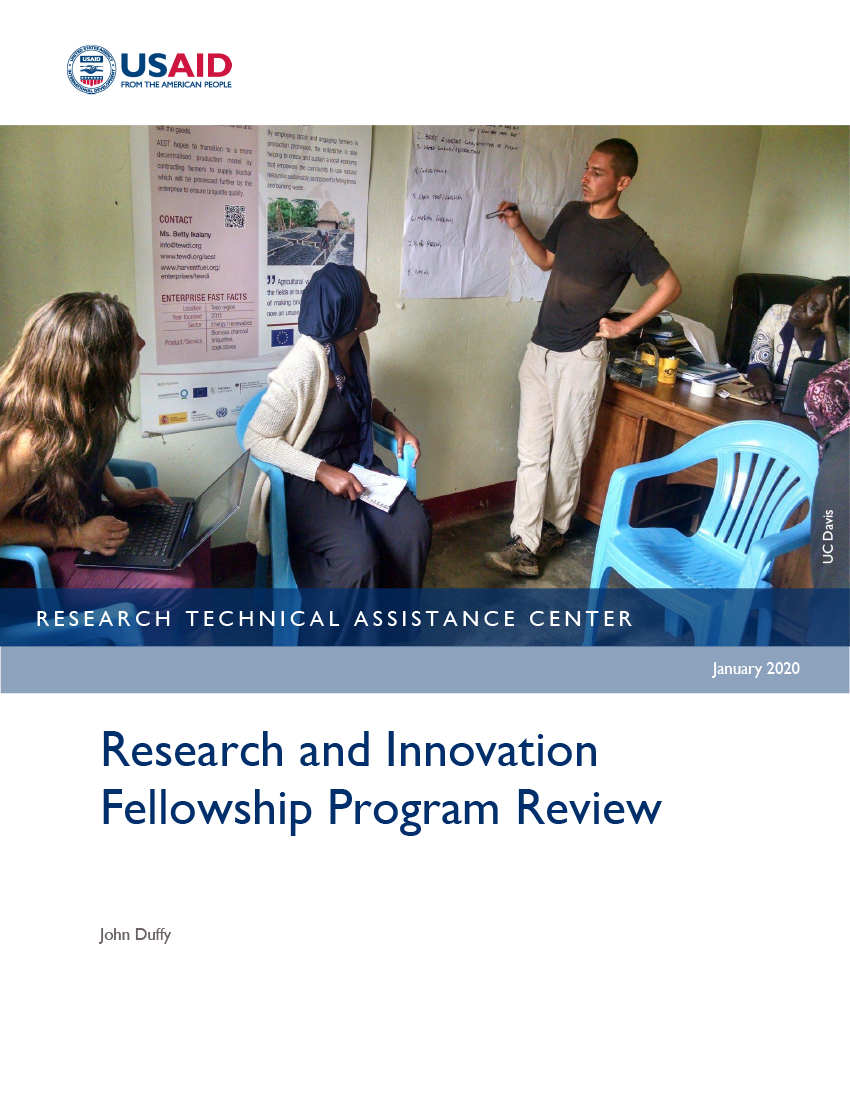- What We Do
- Agriculture and Food Security
- Democracy, Human Rights and Governance
- Economic Growth and Trade
- Education
- Environment and Global Climate Change
- Gender Equality and Women's Empowerment
- Global Health
- Humanitarian Assistance
- Transformation at USAID
- Water and Sanitation
- Working in Crises and Conflict
- U.S. Global Development Lab
Speeches Shim
The Research and Innovation (RI) Fellowship Program was developed and funded by the United States Agency for International Development (USAID), U.S. Global Development Lab (Lab). The program was designed in recognition of the fact that strengthening research capacity and building lasting, collaborative networks are an effective means of promoting economic growth and community advancement in developing countries. The program sought to increase the use of scientific research, tools, and analysis to improve development outcomes through science, technology, and innovation and by building a truly collaborative network of institutions dedicated to international research and science. In essence, the purpose of the RI Fellowship Program was to enhance the research capacities of scientists in developing countries and help develop innovative approaches to meet the world’s development challenges. The program’s three overarching goals were to: 1) create a global network of hosts and Fellows; 2) strengthen, enhance, and expand the network of hosts and Fellows to include third-party stakeholders; and 3) generate positive development impact through facilitation and publication of project collaborations.
USAID partnered with six U.S. universities that had successful, existing international research programs. These programs placed graduate researchers in low- and middle-income countries with the goal of conducting applied research that addressed a wide variety of development challenges, fostering collaboration, and training future research scientists. The six universities included Arizona State University; Rutgers University; University of California, Berkeley; University of California, Davis; University of Chicago; and University of Notre Dame.
This program review was conducted in the framework of the Research Technical Assistance Center (RTAC), a USAID initiative under the Higher Education Solutions Network (HESN) 2.0 portfolio of programs. The purpose of the review is to provide an overview of the USAID RI Fellowship Program and to document the program’s accomplishments and key learnings from 2014–2018. The review focuses on the RI Fellowships portfolio, rather than the individual programs operated by the six universities.
The review found that the RI Fellowship Program did indeed achieve its strategic goals and objectives and should be considered successfully implemented. Over the course of the program’s four operational years (2014–2018), 411 Fellows completed research in 53 developing countries, where they worked with 215 host organizations.1 The work undertaken by the Fellows generated 3142 separate project reports detailing the research that was completed and, in most cases, providing practical applications for furthering development. The cost of the program to USAID was $3,467,521. The six universities provided cost-share funding of approximately $3.0 million through direct cash and in-kind contributions. USAID oversaw the program through regularly scheduled monthly teleconferences and program updates; the universities also filed financial and quarterly and annual reports describing their efforts at implementing, monitoring, and evaluating the program.
This review also identified several aspects that could strengthen future programs with similar goals and objectives:
- Building and strengthening formal collaborations between the U.S. universities and host organizations.
- Promoting collaboration between the participating U.S. universities.
- Improving the mentoring process between the universities and their Fellows.
- Enhancing the dissemination of RI Fellowship Program materials and research results in the U.S. as well as internationally.
However, as seen in Figure 2, the program did achieve its overarching goal of utilizing early-career individuals, mostly graduate students, to leverage science, technology, and innovation to address development issues and to build collaborative partnerships in developing countries. Moreover, the three program objectives of building a collaborative network between Fellows and host organizations, bringing in third-party stakeholders, and publicizing the project collaborations in country were all achieved.


Comment
Make a general inquiry or suggest an improvement.